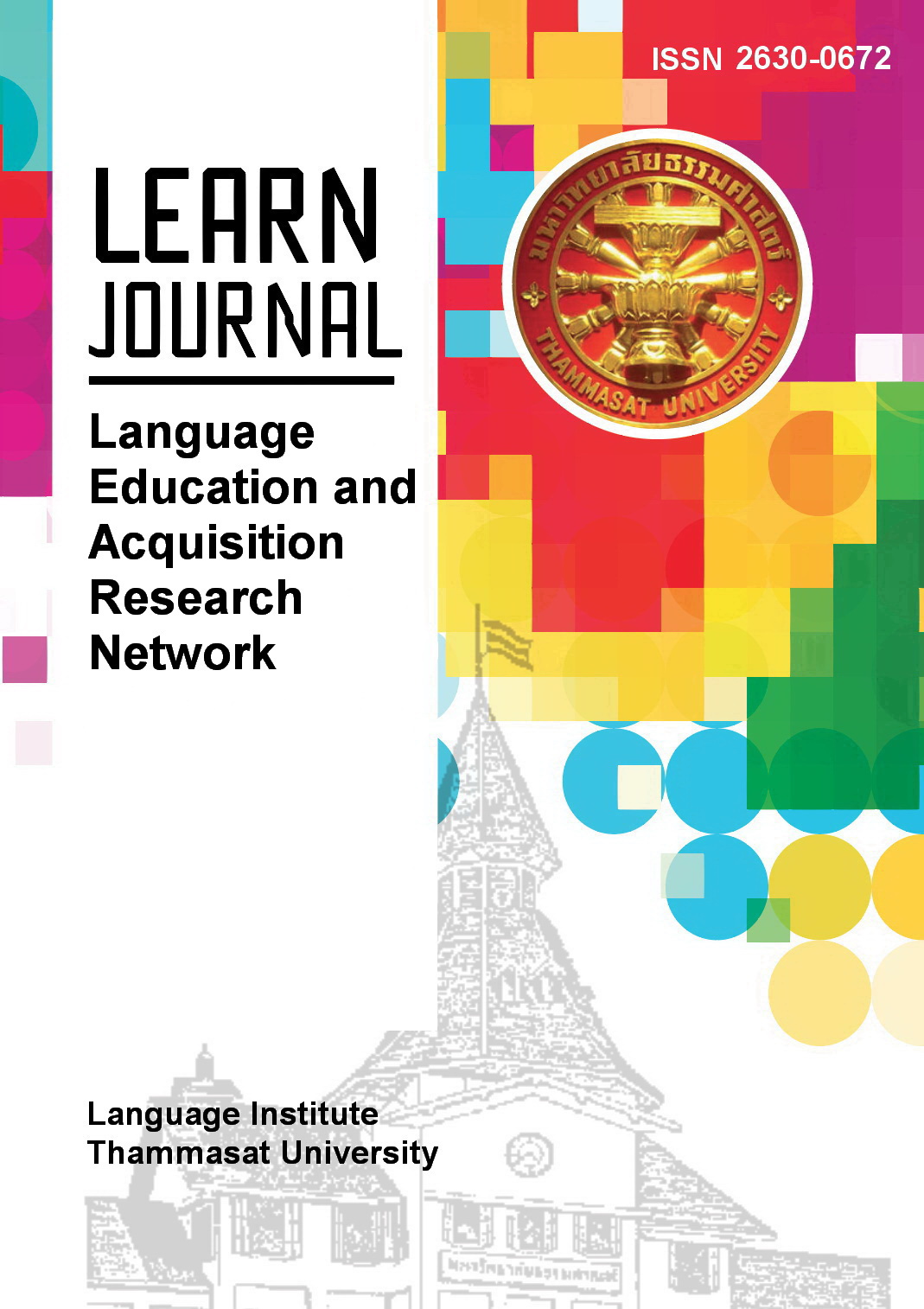Fostering Learner Autonomy of Thai Lower Secondary School Students in Project-Based English Instruction
Main Article Content
Abstract
Learner autonomy has caught the attention of educators and researchers as one of the educational goals of the 21st century and as a factor that can affect second language learning. Efforts to foster learner autonomy in English classrooms have been ongoing. The study aimed to enhance learner autonomy of lower secondary school students. Thirty-nine Thai students voluntarily signed up for the course. The development of their autonomy was examined using three instruments. First, a questionnaire adapted from Murase (2015) was employed before and after the instruction. During the course, the students were asked to keep learning logs. Lastly, based on the questionnaire results, six students were selected to be interviewed after the instruction. The data from the three sources were analyzed and used to triangulate with one another. The project-based English instruction showed positive effects on learner autonomy. The questionnaire showed an increase in students’ level of autonomy overall and in each dimension: technical, psychological, political, and sociocultural. The learning logs and interviews also showed signs of learning independence over time. These findings confirm that learner autonomy can and should be fostered in English classrooms.
Article Details
References
Aggarwal, A. (2021). Global framework on core skills for life and work in the 21st century. International Labour Organization. https://www.ilo.org/skills/pubs/WCMS_813222/lang--en/index.htm
Beckett, G. (2002). Teacher and student evaluations of project-based instruction. TESL Canada Journal, 19(2), 52–66. https://doi.org/10.18806/tesl.v19i2.929
Benson, P. (1997). The philosophy and politics of learner autonomy. In P. Benson & P. Voller (Eds.), Autonomy and independence in language learning (pp. 18–34). Longman.
Benson, P. (2011). Teaching and researching autonomy (2nd ed.). Routledge.
Candy, P. C. (1991). Self-direction for lifelong learning: A comprehensive guide to theory and practice. Jossey-Bass.
Chen, C.-H., & Yang, Y.-C. (2019) Revisiting the effects of project-based learning on students’ academic achievement: A meta-analysis investigating moderators. Educational Research Review, 26, 71–81. https://doi.org/10.1016/j.edurev.2018.11.001
Chusanachoti, R. (2016). A causal comparative study: Effect of out-of-class English activities on English skills development of undergraduate students majoring in English teaching. Kasetsart Journal of Social Sciences, 37(2), 188–199. https://so04.tci-thaijo.org/index.php/ kjss/article/view/242854
Daflizar, D. (2023). Approaches to fostering learner autonomy in EFL learning. JOURNEY (Journal of English Language and Pedagogy), 6(1), 148–160. http://doi.org/10.33503/journey.v6i1.2650
Díaz Ramírez, M. I. (2014). Developing learner autonomy through project work in an ESP class. HOW Journal, 21(2), 54–73. https://doi.org/10.19183 /how.21.2.4
Fried-Booth, D. L. (2002). Project work. Oxford University Press.
Holec, H. (1981). Autonomy and foreign language learning. Pergamon.
Larmer, J., Mergendoller, J., & Boss, S. (2015). Setting the standard for project based learning. ASCD.
Law, Y. Y. E. (2023). Fostering learner autonomy: A social-constructivist approach to designing English language teaching activities. TESOL Journal, 14(1), 1–5. https://doi.org/10.1002/tesj.696
Little, D. (1991). Learner autonomy: Definitions, issues and problems. Authentik.
Littlewood, W. (1996). “Autonomy”: An anatomy and a framework. System, 24(4), 427–435. https://doi.org/10.1016/S0346-251X(96)00039-5
Loima, J., & Vibulphol, J. (2014). Internal interest or external performing? A qualitative study on motivation and learning of 9th graders in Thailand basic education. Journal of Education and Learning, 3(3), 194–203. https://doi.org/10.5539/jel.v3n3p194
Loima, J., & Vibulphol, J. (2016). Learning and motivation in Thailand: A comparative regional study on basic education ninth graders. International Education Studies, 9(1), 31–43.
https://doi.org/10.5539/ies.v9n1p31
Melvina, M., & Julia, J. (2021). Learner autonomy and English proficiency of Indonesian undergraduate students. Cypriot Journal of Educational Sciences, 16(2), 803–818. https://orcid.org/0000-0002-0249-0264
Murase, F. (2015). Measuring language learner autonomy: Problems and possibilities. In C. Everhard & D. Murphy (Eds.), Assessment and autonomy in language learning (pp. 35–63). Palgrave Macmillan.
Nguyen, V. L. (2017). Promoting learner autonomy: Lesson from using project work as a supplement in English skills courses. Can Tho University Journal of Science, 7, 118–125. https://doi.org/10.22144/ctu.jen.2017.057
Nunan, D. (1988). The learner-centred curriculum: A study in second language teaching. Cambridge University Press.
Oxford, R. L. (2003). Toward a more systematic model of L2 learner autonomy. In D. Palfreyman & R. C. Smith (Eds.), Learner autonomy across cultures (pp. 75–91). Palgrave Macmillan.
Phasuk, P., Prabjandee, D., & Surasin, J. (2019). Fostering learner autonomy in an English classroom by using project-based learning. HRD Journal, 10(1), 33¬–45. http://ojslib3.buu.in.th/index.php/hrd/article/view/6258
Pichailuck, P., & Luksaneeyanawin, S. (2017). Enhancing learner autonomy in rural young EFL learners through project-based learning: An action research. ABAC Journal, 37(2), 16–32. http://www.assumptionjournal.au.edu/index.php/abacjournal/article/view/3040
Stein, S. G. (1995). Equipped for the future: A customer-driven vision for adult literacy and lifelong learning. National Institute for Literacy.
Swatevacharkul, R., & Boonma, N. (2021). Learner autonomy assessment of English language teaching students in an international program in Thailand. Indonesian Journal of Applied Linguistics, 10(3), 751–761. https://doi.org/10.17509/ijal.v10i3.31764
Tayjasanant, C., & Suraratdecha, S. (2016). Thai EFL teachers and learners’ beliefs and readiness for autonomous learning. 3L: Language, Linguistics, Literature, 22(3), 153–169. http://doi.org/10.17576/3L-2016-2203-11
Vibulphol, J. (2016). Students’ motivation and learning and teachers’ motivational strategies in English classrooms in Thailand. English Language Teaching, 9(4), 64–75.
http://dx.doi.org/10.5539/elt.v9n4p64
Wiraningsih, P., & Dewi, N. (2020). The roles of EFL teachers in promoting learner autonomy. Jurnal Pendidikan dan Pengajaran, 53(1), 13–24. https://doi.org/10.23887/jpp.v53i1.19241
Yuliani, Y., & Lengkanawati, N. S. (2017). Project-based learning in promoting learner autonomy in an EFL classroom. Indonesian Journal of Applied Linguistics, 7(2), 285–293. https://doi.org/10.17509/ijal.v7i2.8131


